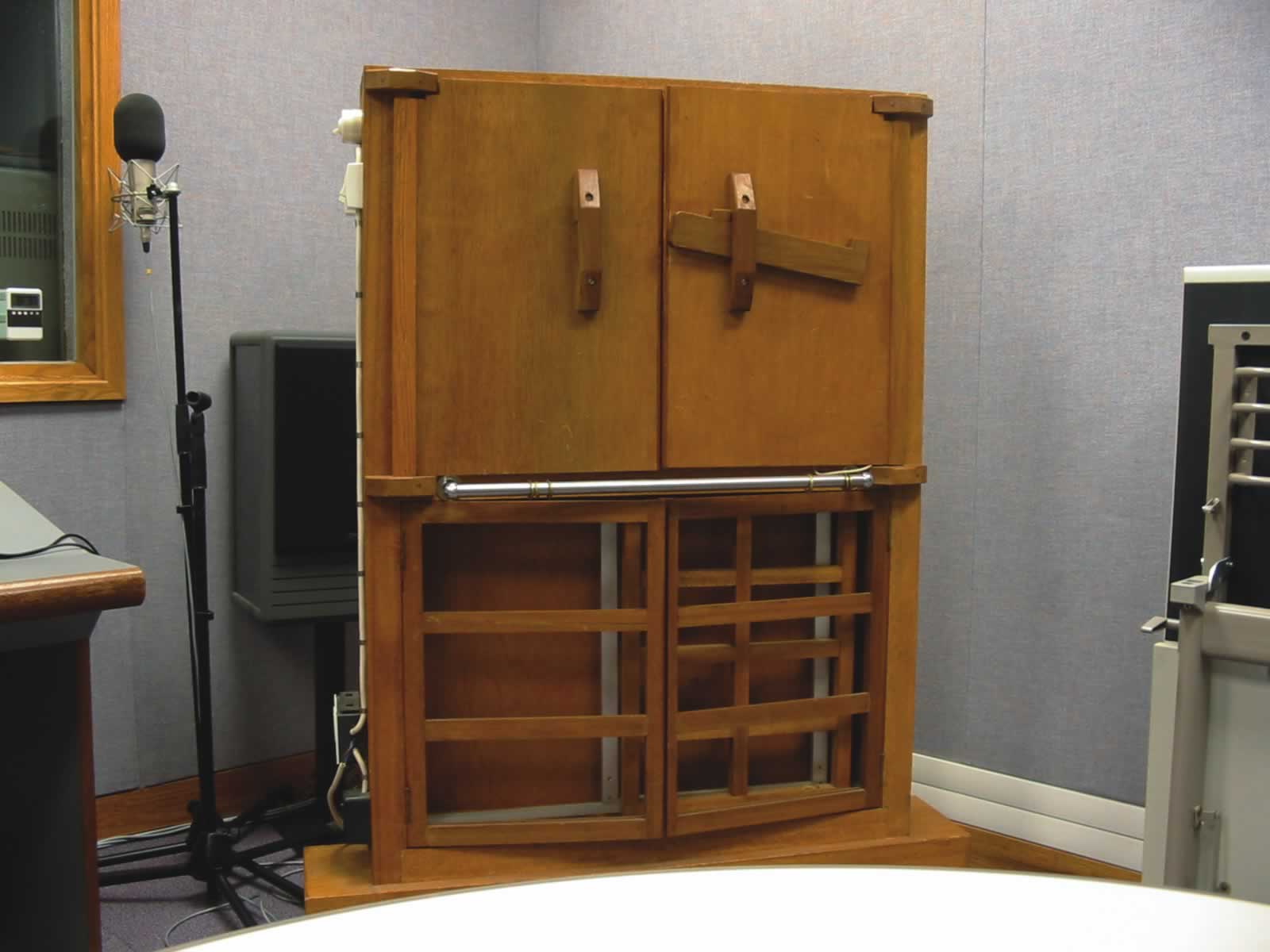.jpg)
Radio drama
Survival on air
By Jenny Chan
| Jenny
Chan |
 |
| Wooden cupboard used for sound effects. |
The production of radio dramas peaked in Hong Kong in
the '70s.
¡§At that time, Radio Hong Kong broadcast 52 half-hour radio dramas and
a one-hour well-known drama per week,¡¨ said Chung Wai-ming. Nicknamed
the ¡§Broadcast King¡¨, he has been in the field of radio drama for the
last half century.
Newspapers and magazines covered details of radio dramas at that time
every day, listing out names of dramas, broadcasters and staff. Some even
described popular story plots. These helped promoting radio dramas.
However, radio dramas began to decline in the ¡¦80s when television and
computers emerged.
Yiu Sau-ling, a producer at Radio Television Hong Kong Radio 1, said that
radio listeners today are more mature.
¡§According to audience research, listeners are usually older people.
¡§Young people prefer playing computer games to listening to radio dramas,¡¨
Miss Yiu said.
Drivers, the blind and housewives are loyal radio drama listeners.
¡§Radio dramas are not only entertainment now,¡¨ she said.
¡§¡§Radio dramas provide listeners with vast amounts of updated information
and deliver positive messages by producing many realistic stories.
¡§These stories reflect social problems and encourage people to overcome
their difficulties.¡¨
There is another kind of radio drama which promote new films, stage dramas,
or novels.
¡§Creating a good radio drama is expensive,¡¨ said Miss Yiu. ¡§Wages of script
writers are high. Since the late ¡¦80s, radio stations tend to buy scripts
of popular novels and then dramatize them.¡¨
Now radio drama script writers are freelancers, also writing for television
programs and films.
Radio dramas are no longer done live now. Studios are computerized. Technicians
mix and adjust background music and create sound effects with advanced
equipment.
Similar to script writers, radio drama broadcasters work as freelancers.
Said Mr. Chung: ¡§Broadcasters were professionals in the past. Because
there was no recording equipment, all programs were live.
¡§Technical supporters created live sound effects in the studio to add
realism to the dramas.
¡§To imitate the crash of thunder,¡¨ he continued, ¡§technicians rolled a
dumbbell on a wood piece.
¡§Variations of imitated sound depended on the control of the technicians.
¡§Broadcasters had to practise and rehearse many times as well.¡¨
According to Miss Yiu, radio stations have not recruited full-time radio
drama broadcasters for over a decade.
¡§Radio stations stopped providing training courses for new broadcasters
about 14 years ago,¡¨ she said.
Most broadcasters are also dubbers of films or television programs.
Some disc jockeys take part in radio dramas as well.
¡§Another reason for the absence of full-time broadcasters is that nowadays
young people want to be disc jockeys rather than broadcasters.
¡§Radio stations also invite famous pop stars, like Eason Chan and Andy
Hui, to broadcast in order to attract young listeners. Radio stations
design tailored scripts for pop stars.¡¨
The broadcasting time of radio dramas these days is much shorter.
¡§Hong Kong people are busy,¡¨ said Miss Yiu. ¡§Listeners don't have the
patience to listen to long serials.
¡§Nowadays radio dramas end within one or two weeks, instead of lasting
over a hundred episodes.¡¨
Moreover, the timetable of programs has changed.
¡§In the morning, cheerful and lively dramas such as family stories are
broadcast.
¡§In the afternoon, light-hearted love stories based on famous novels are
on air,¡¨ said Miss Yiu.
Another obvious change is the promotion.
Newspapers and magazines are no longer enthusiastic about reporting radio
dramas.
However, radio stations benefit from the by-products of radio dramas.
The sound tracks and the theme songs of the radio dramas are recorded
in compact discs for sale.
Some radio dramas are made into films and comics as well, such as Merry
Go Round.
In contrast to television dramas and computers, which satisfy the audience¡¦s
visual and audo senses, radio dramas attract audience merely through audio.
¡§Radio drama is struggling,¡¨ said Mr. Chung. ¡§The production of radio
dramas has dropped around 80 percent, compared with its golden time.¡¨
Miss Yiu predicted that because of the limited budget, radio stations
will keep reducing the production of radio dramas.
![]()